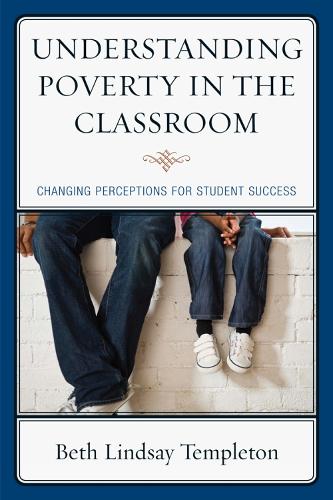
Understanding Poverty in the Classroom: Changing Perceptions for Student Success
(Paperback)
Publishing Details
Understanding Poverty in the Classroom: Changing Perceptions for Student Success
By (Author) Beth Lindsay Templeton
Bloomsbury Publishing PLC
Rowman & Littlefield Education
16th June 2011
United States
Classifications
Professional and Scholarly
Non Fiction
Educational administration and organization
371.826942
Winner of 9.49.
Physical Properties
Paperback
114
Width 155mm, Height 234mm, Spine 12mm
236g
Description
People who live in poverty consider life in different ways than those who have adequate basic resources. Many educators tend to see the world through their middle-class worldview. Because of this, they do not understand these significant and often rational differences. They may misinterpret behavior they see and ascribe negative connotations to how their students are reacting. Their assumptions can affect the quality of both the teaching and the learning that happens. Most teachers have real passion for educating their students but their experiences limit how they relate to the challenges some of their students face daily.
Understanding Poverty in the Classroom:
* Identifies perceptual differences
* Teaches strategies to address the special needs of children from poverty
* Encourages teachers to learn about the neighborhoods where their students live and what to look
for in those areas
* Confronts myths about poverty and reinforces learning with specific illustrations
This resource is interactive with exercises that increase the reader's learning and provides specific tools to improve the educational process for teachers, students, and parents.
Reviews
Today's teachers face the challenge of growing numbers of children of poverty in schools. Templeton provides suggestions to maximize the schooling experience of these students. Their success in school is largely dependent upon an informed, nurturing faculty armed with a realistic understanding of students, their instructional needs, and an array of practical teaching strategies. Because the life experience of these students differs drastically from that of their teachers and classmates, common misunderstandings abound. For example, fulfilling homework can become impossible for students who are homeless or who live in a crowded, multifamily setting. A teacher may suspect low mental capacity in a student unable to answer a question like 'What's your shoe size,' unaware that the student has worn only shoes that were found or given to her. Teachers adapt everyday interactions, like giving directions, to help students develop sequential skills by dividing tasks into components and providing students with something concrete (e.g., a sticky note) delineating each part. They can provide cues so that students who live with uncertainty can learn to identify when a lesson actually begins. This book provides teachers a much-needed resource to address the increasing amount of child poverty in schools. Summing Up: Recommended. All readership levels. * Choice Reviews *
This is a wonderful, much-needed book. Most educators will find the length and format appealing. The prose is passionate but objective and based on solid research without being overly theoretical. -- A. Scott Henderson, associate professor of education and coordinator of secondary education, Furman University
It is an important book for educators and Beth Lindsay Templeton uses poignant examples to embed knowledge. The exercises and the conversational writing style are well-developed. -- Lesley Quast, assistant academic dean, Furman University
America will live up to its aspirations for public education only if students in poverty excel to high expectations. Beth Lindsay Templeton has worked for years to understand, address, and explain the issues faced by families in poverty. Anyone interested in America's future and the future of America's communities will benefit from her wisdom and insights. -- Frank Holleman, former U.S. Deputy Secretary of Education
Author Bio
Beth Lindsay Templeton, director of Our Eyes Were Opened, is a community activist, innovator, minister, consultant, teacher, and writer. She began her career as a secondary mathematics teacher and for the last twenty-eight years has worked at United Ministries, a non-profit in Greenville, South Carolina.
